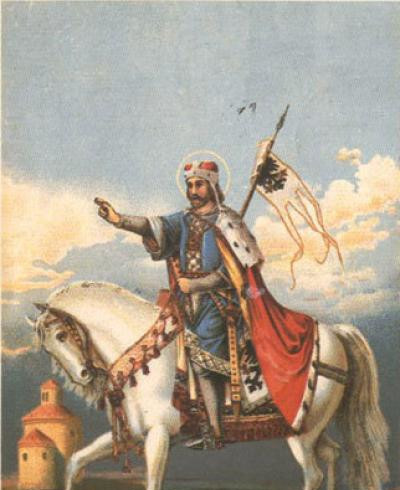
Saint of the Day for 28 September: St Wenceslas
The patron saint of Bohemia: its history and significance
Name
St Wenceslas
Title
Martyr
Birth
c. 907, Stochow, Prague, Czech Republic
Death
936, Stará Boleslav, Czech Republic
Recurrence
28 September
Martyrology
2004 edition
Prayer
O God, who gave the martyr Saint Wenceslas the courage to put the kingdom of heaven before the allurements of earthly power, through his intercession grant us too the courage to overcome all forms of selfishness in order to adhere to you with all our hearts. Through Jesus Christ our Lord. So Be It.
Roman Martyrology
St Wenceslas, martyr: Duke of Bohemia, he was educated in human and divine wisdom by his paternal aunt Ludmilla and, although strict with himself, was nevertheless a man of peace in administering the kingdom and merciful to the poor and ransomed en masse the pagan slaves for sale in Prague so that they could be baptised; after facing many difficulties in governing his subjects and educating them in the faith, betrayed by his brother Boleslaus, he was killed in church in Stará Boleslav in Bohemia by assassins.
The Saint and Mission
St Wenceslas, the patron saint of Bohemia, was a historical figure whose life and mission were deeply intertwined with the aspiration to promote Christian justice and righteousness in his kingdom. St Wenceslas’ mission extended far beyond political boundaries, seeking to embody and spread Christian values in a time of great turmoil and uncertainty.
His mission was rooted in a deep faith and sincere devotion that drove him to pursue a more equitable and compassionate society. The challenges and adversities he encountered during his reign tested him, but also strengthened his commitment to a mission of love and service. St Wenceslas was not simply a ruler, but saw himself as a servant of God and his people, committed to creating an environment in which justice and mercy could flourish.
Legend tells of St Wenceslas walking the streets on cold winter nights to bring gifts to the poor and needy, embodying a mission of service that went far beyond royal duty. It was a tangible manifestation of his understanding of the Christian mission, which extended far beyond the confines of the royal palace to the hearts and lives of his subjects.
The actions of St Wenceslas represent a mission deeply rooted in love of neighbour and a dedication to the cause of justice and truth. He was driven by a sincere desire to see his people prosper, not only in material terms, but also in spiritual ones. His mission was to create a society that reflected Gospel values, promoting peace, justice and human dignity.
The legacy of St Wenceslas continues to resonate through the centuries, providing an example of how faith can guide and inform a mission of authentic service. His life represents an ongoing challenge to seek justice, to love mercifully and to live with integrity in the fulfilment of the Christian mission in a world in need of such witnesses of hope and love. His example remains a guiding light that invites us to consider how we can embody Christian values in our personal and collective missions, working together to build a more just and compassionate world.
The Saint and Mercy
St Wenceslas is an emblem of mercy and benevolence within the Christian tradition. His life and reign were marked by a deep sense of duty to the less fortunate and a sincere desire to lead with justice and compassion. Mercy, in the Christian context, goes beyond mere empathy or compassion; it is an active attitude of love and care towards those in distress or need.
The narrative of St Wenceslas’ life illustrates his deep commitment to mercy. A ruler in a time of turmoil and conflict, he strove to establish lasting peace in his region, protecting the poor and helpless. His rule was a reflection of a merciful kingship that aimed to elevate the welfare of his subjects. This dedication to mercy was rooted in his Christian faith, which he saw as a vehicle to express God’s love through tangible actions of kindness and social justice.
St Wenceslas not only exercised mercy through his policies, but also through personal acts of generosity. He was described as a father figure to his subjects, always ready to listen to their difficulties and provide assistance. His mercy was seen not as a sterile obligation, but as a genuine expression of love and responsibility towards one’s neighbour.
St Wenceslas’ legendary generosity and inclination towards mercy made him an enduring example of Christian virtue. His legacy reminds us of the importance of mercy as a guiding principle in leadership, emphasising that true authority is best expressed through love and care, rather than domination or constraint.
St Wenceslas’ lessons of mercy are particularly resonant in a world that often seems polarised and insensitive to the suffering of others. They invite us to reflect on our personal commitment to mercy, encouraging a culture of empathy and mutual assistance. St Wenceslas emerges not only as a revered saint, but as an eternal symbol of how mercy can effectively transform communities and create a more just and equitable society.
Hagiography
S. Wenceslas, king of Bohemia, was the son of Uratislaus and Drahomira and grandson of Boivorus, the first Christian duke of Bohemia and the blessed Ludmilla. His father Uratislaus was a virtuous, valiant and benign prince; but his mother Drahomira, an atheist and pagan, combined devilish haughtiness with great cruelty and perfidy. Wenceslas also had a…
